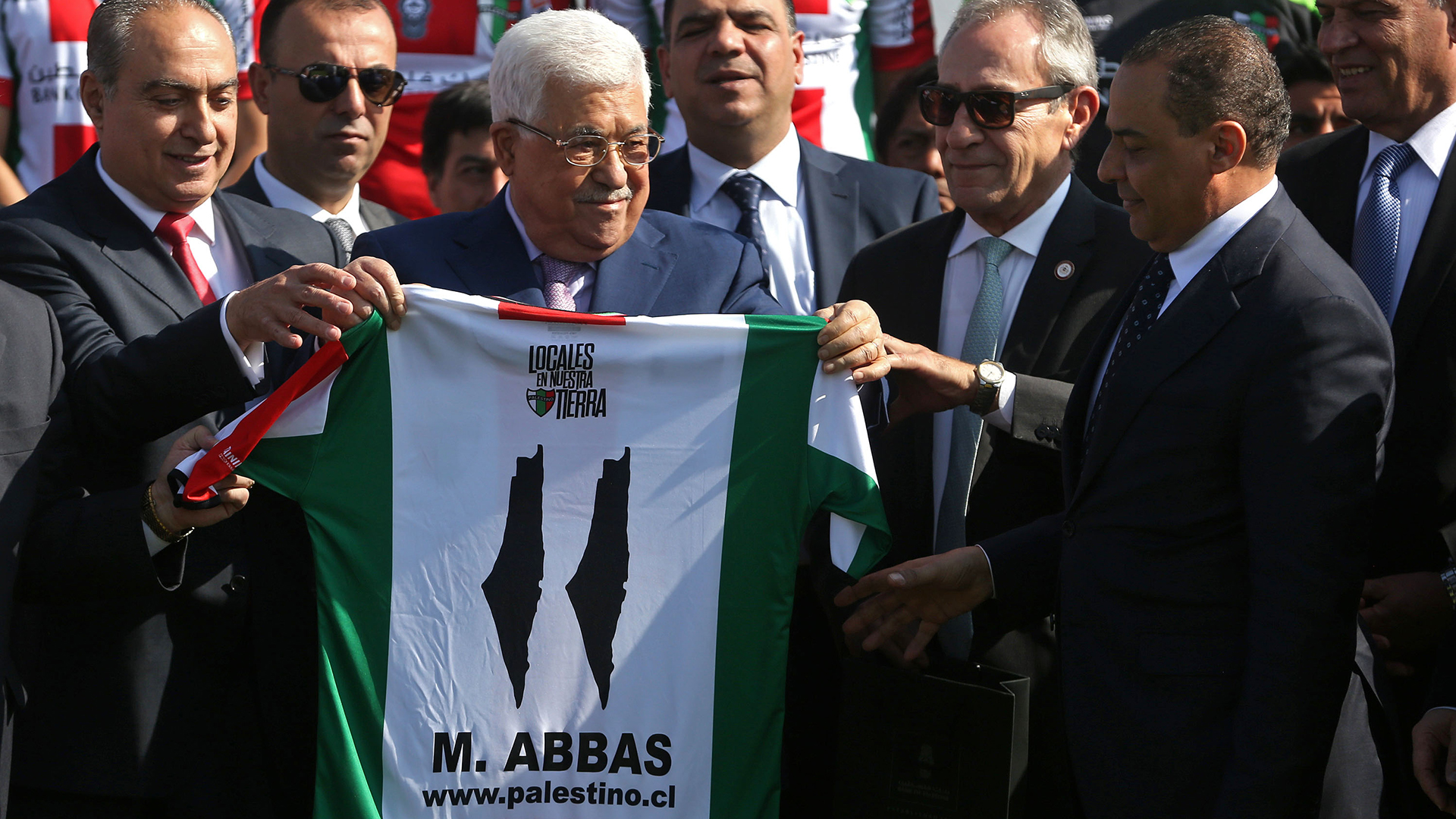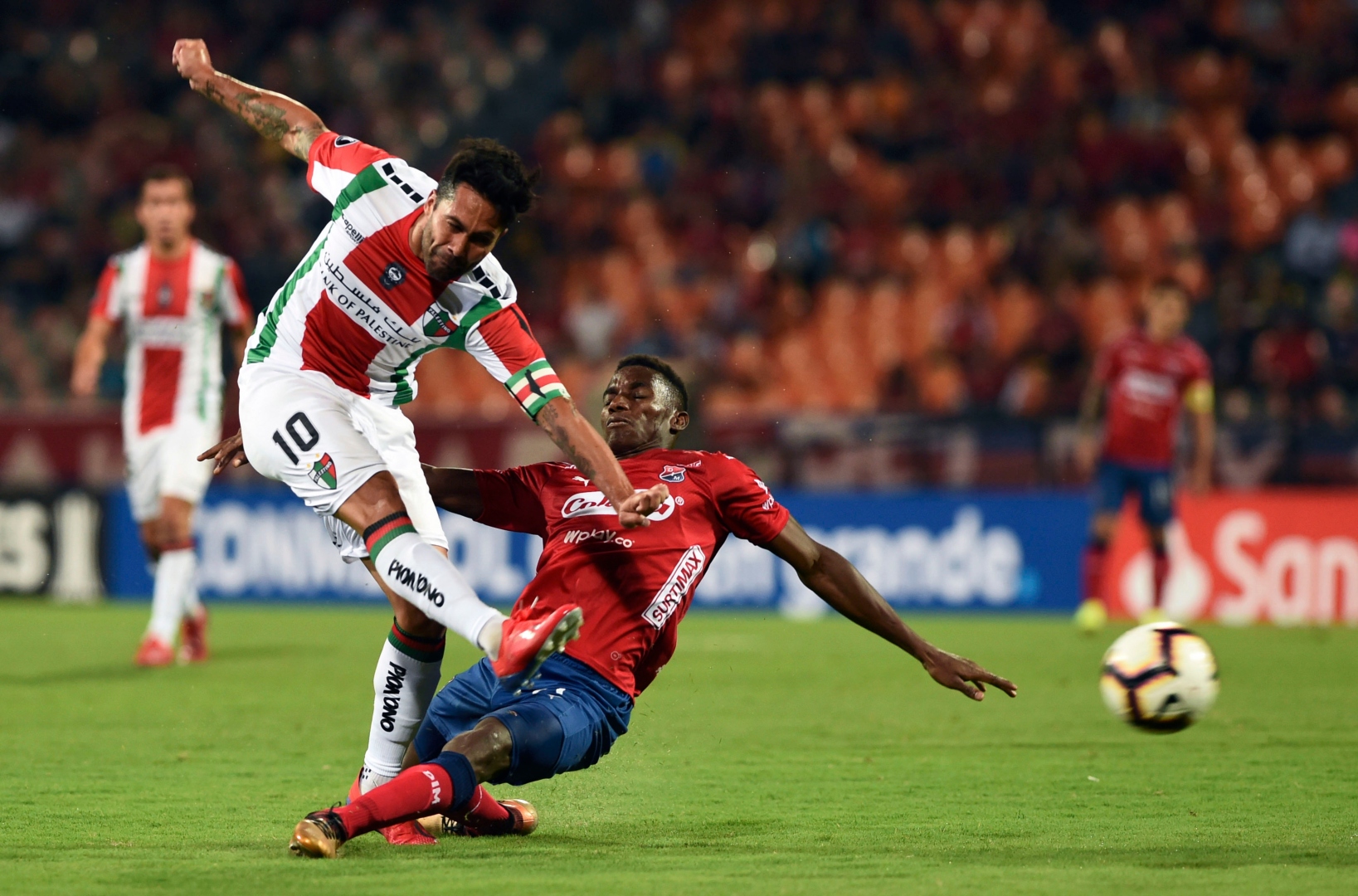At his best, he was a mercurial playmaking genius. At his worst, an apathetic, entirely ineffective loose cannon.
However, Luis Jimenez is blessed with incredible talent with the ball, and retains the ability to change the course of a match with a single inspired movement.
Now, at 34 years old, he has led boyhood club Palestino to the brink of the Copa Libertadores group stage. In the process, Jimenez is also winning plaudits from unexpected circles.
Indeed, he can count the Palestinian Liberation Organisation (PLO), the group which for more than 50 years has fought against Israeli presence in disputed territories, among his supporters.
“I think Luis Jimenez embodies the feeling of Palestinians in general, not just the club,” Xabier Abu Eid, a Chilean-born member of the PLO, told ADN Deportesfrom the West Bank town of Beit Jala, after watching the veteran net a goal and convert his spot-kick in an agonising Libertadores shoot-out victory over Medellin last week.
“To fight always, and never give up. I saw him do that today in Medellin, with his goal, his penalty and the fighting spirit that he and the rest of the team demonstrated.”
Since their foundation in 1920 by Palestinian immigrants in Chile, Palestino has served as a rallying point for the community.
The team wears the distinctive green, white and red colours that also appear on the Palestinian flag, while the Bank of Palestine has served as their principal sponsor almost uninterruptedly for the last decade.
Last year, the Santiago side even welcomed Palestinian president Mahmoud Abbas for a visit, with the politician testing 'Arabs' keeper Dario Melo from the penalty spot.
That commitment to the Palestinian cause has led to trouble in the past, though.
In 2014, the club was fined by the Chilean FA and banned from using a new shirt edition which, instead of the number one on the back, featured a reproduction of the Palestinian borders prior to partition in 1947.
Jewish groups in Chile, as well as the Israeli government, registered their disapproval, with one community leader calling the move "a lousy form of political violence in Chilean football."
Palestino, however, remained unrepentant.
"For us, free Palestine will always be historical Palestine, nothing less," the club's statement read. Nonetheless, they finally relented and reverted to traditional numbering after being sanctioned by the Chilean governing body.
It was in this unique club that Jimenez came to prominence.

Of Palestinian extraction himself, he came up through Palestino's youth ranks and made his debut in 2001 less than three months after celebrating his 17th birthday.
The teenager needed just nine games to convince Serie B team Ternana to invest in his budding talents and take him to Italy, with his path to the top flight completed in 2006 when Fiorentina swooped to sign him, still aged only 21.
But Jimenez had not been freed from Ternana. The club continued to control 50 per cent of his playing right under Italy's convoluted co-ownership rules, and refused to relinquish their stake.
"I always had a lot of offers," the player explained in a 2016 interview with Goal . "I was always going on loan, I was doing well, but then I would always return to Terni and every time, it was always the same story.
"I was receiving offers but there was no way to speak with the club. Then, on the final day of the market, they would send me somewhere. The wait was always nerve-racking."
Even at Inter, where he made a positive initial impression, the Chilean remained at the mercy of Ternana, who had moved the other way in dropping out of Serie B and into the lower reaches of the Italian pyramid.
A succession of injuries and endless loan moves stunted his growth, while there were also well-publicised personal issues: famously, he once faced criminal assault charges from ex-Chile team-mate Mauricio Pinilla, whom he attacked in a nightclub over rumours that his partner had committed adultery with the forward.
Jimenez continued to be farmed out in a succession of loan spells by Ternana. Some were successful, such as at Cesena where he helped the club stay in Serie A. Others, like his spell with West Ham, were entirely disappointing.

Only in 2011 did he finally manage to free himself of his club, moving to the United Arab Emirates when he was just 25 and should have been at his peak. That same summer also saw the end of his international career, though, with an August friendly against France proving the last of his 26 caps for Chile.
Now, after seven years plying his trade in the middle east between the UAE and Qatar, Jimenez is back where it all began. And he has made an instant impact.
Weeks after sealing his move to Palestino, the evergreen attacker netted the decisive strike in a 3-2 victory over arch-rivals Audax Italiano to deliver the Copa Chile for his side, a win that earned the Arabs a place in the Libertadores.
He also steered relegation-threatened Palestino to Primera survival with two wins and two draws in their last five outings in 2018, eventually finishing four points clear of the drop zone.
On Wednesday, Palestino begin their quest for the biggest prize of the year so far. Argentine side Talleres beckon in the Copa's final qualifying round, with the first leg set to be played in the expanses of Cordoba's Estadio Mario Kempes.
If the Chileans can negotiate that tie, a place in Group A of the competition proper beckons, along with a healthy windfall in prize and television money.
It will not be a smooth ride. If Talleres fall by the wayside, Palestino enter what will arguably constitute the 2019 Copa's 'group of death', alongside holders River Plate, Brazilian giants Internacional and Peru's Alianza Lima.
Everyone at the club will be looking to Jimenez, his ability and experience to guide them through South America's biggest competition – as will plenty of keen observers and football fans on the other side of the world in Palestine itself.









0 Comments